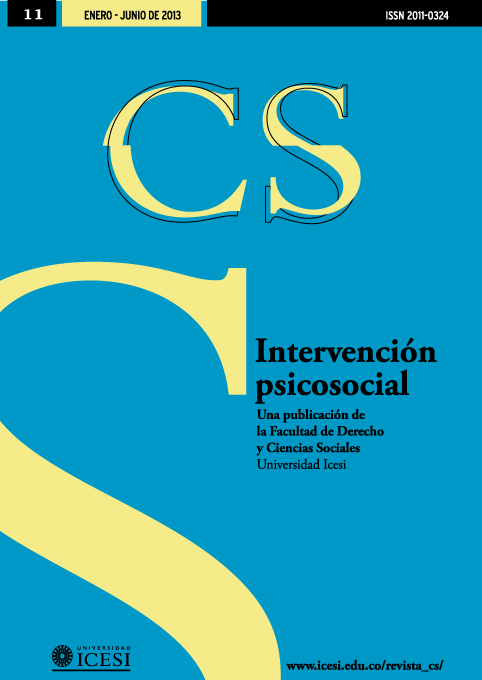A Cultural Perspective of Subjectivity: Development from a Fragmentary Legacy
DOI:
https://doi.org/10.18046/recs.i11.1565Keywords:
Subjectivity, Subject, CultureAbstract
This article will show how transformations in the human psyche, based on the cultural character of the productions and practices of man, allow for the revival of subjectivity as a qualitative level unique to humans. Understood from this perspective, subjectivity is a process inherent to the cultural functioning of man and to the social world generated by its cultural productions. The text attempts to challenge the exclusion of subjectivity in favor of post–structuralism and neo–pragmatism, perspectives that dismissed this notion for bearing the limitations of modern thought. Faced with this position, the article argues that neither of these schools of thought had a theoretical awareness of subjectivity, a concept that, in fact, runs counter to the fundamental principles that underpinned late modernity, based on the idea of objective science and man's rational representation.
Downloads
References
Bozhovich, L. I. (1968). La personalidad y su desarrollo en la edad infantil. La Habana, Cuba: Pueblo y Educación.
Bruner, J. (1985). Vygotsky: a historical and conceptual perspectiva. En J. Wertsch (Ed.), Culture Communication and Cognition. Vygotskian perspectives (pp. 21–34) Londres, Inglaterra: Cambridge University Press.
Buber, M. (2009). ¿Qué es el hombre?. México D. F., México: Fondo de Cultura Económica.
Budilova. E. A. (1983). Sotcialno– psikjologicheskie problemy v Ruskoi nayke. Moscú, Rusia: Nauta.
Eagleton, T. (2000). A idéia de cultura. São Paulo, Brazil: Editora UNESP.
Frow, J. (1995). Cultural Studies and Cultural Value. Oxford, Inglaterra: Clarendon Press.
Geertz, C. (1973). The Interpretation of Cultures. New York, USA: Basic Books.
Gergen, K. (2006). Construir la realidad. El futuro de la psicoterapia. Barcelona, España: Paidos.
González Rey, F. (2007). Social and individual subjectivity from an historical cultural standpoint. Critical Social Studies, 9 (2), 3–14.
González Rey, F. (2002). Sujeto y subjetividad: una aproximación histórico–cultural. México D. F., México: Thomson.
González Rey, F. (2008). 'Different periods in Vygotsky's work: their implications for arguments regarding his legacy'. Ponencia presentada en el simposio 'Discussing Vygotsky's legacy: new alternatives in the understanding of his legacy and unfolding of his work'. ISCAR, 2008. San Diego, USA.
González Rey, F. (2009). Historical relevance of Vygotsky's work: its significance for a new approach to the problem of subjectivity in psychology. Outlines. Critical Practice Studies, (1), 59–73.
Leontiev, A. A. (1992). Ecce Homo. Methodological Problems. Multidisciplinary newsletter for Activity Theory, (11/12), 41–44.
Maturana, H. y Varela, F. (1987). The tree of knowledge: the biological roots of human understanding. Boston, USA: New Science.
Minick, N. (1987). The development of Vygotsky's thought: an introduction. En R. Rieber y A. Carton (Eds.), The collected works of L. S. Vygotsky (pp. 17–38) New York, USA: Plenum Press.
Voloshinov, V. N. (2009). El Marxismo y la filosofía del lenguaje. Buenos Aires, Argentina: Ediciones Godoy.
Vygotsky, L. S. (1984). K voprocu o psikjologii judochestvennovo tvorschestva aktera. En M. G. Yarochevsky (Redactor), Vygotsky. L. S. – Sobranie sochinenii. V. 6. Moscú, Rusia: Pedagógica.
Vygotsky, L. S. (1987). Thinking and Speech. En R. Rieber y A. S. Carton (Eds.), The collected works of L.S.Vygotsky. Vol. 1 (pp. 43–287) New York, USA: Plenum Press.
Wertsch, J. (1985). Introduction. En J. Wertsch (Ed), Culture, Communication and Cognition. Vygotskian perspectives (pp. 1– 20) Londres, Inglaterra: Cambridge University Press.
Yarochevsky, M. (2007). L. S. Vygotsky: v poiskax novoi psykjologii. Moscú, Rusia: Editora LKP.
Downloads
Published
Issue
Section
License
Copyright (c) 2013 Fernando Luis González Rey

This work is licensed under a Creative Commons Attribution-NonCommercial 4.0 International License.
© Reserved Copyright
Material in this publication may be reproduced without authorization, provided the title, author and institutional source is acknowledged.
The content published in Revista CS is distributed under the Creative Commons BY-NC 4.0 Attribution/Recognition-NonCommercial 4.0 International license.
You are free to:
Share — copy and redistribute the material in any medium or format.
Adapt — remix, transform, and build upon the material.
Under the following terms:
Attribution — You must give appropriate credit , provide a link to the license, and indicate if changes were made . You may do so in any reasonable manner, but not in any way that suggests the licensor endorses you or your use.
NonCommercial — You may not use the material for commercial purposes.












